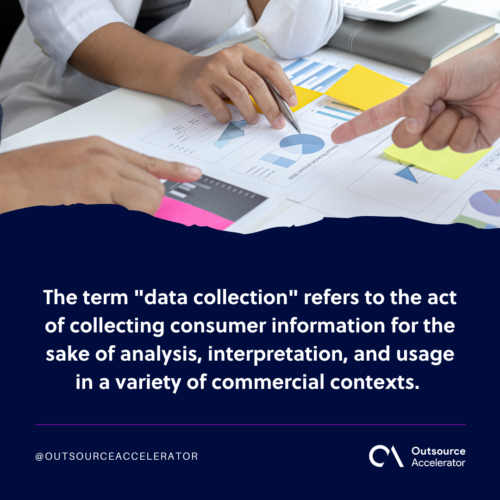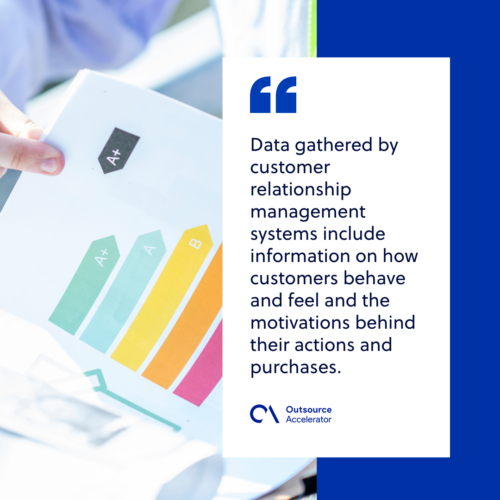Data collection strategy: What you need to know

Collecting data in this modern age requires stringent methods and robust data collection equipment. This is to help organizations collect both quantitative data and qualitative data that adhere to data privacy laws.
That said, firms should create a reliable data collection strategy and stay ahead of the market competition.
Defining data collection strategy
The term “data collection” refers to the act of collecting consumer information for the sake of analysis, interpretation, and usage in a variety of commercial contexts.
A data collection strategy is the collection of methods that will be utilized to get accurate and reliable data from different data sources.

3 types of data collection strategy
Data collection strategies can be divided into three types:
1. Market research
Market research is the first form of a data collection strategy. This refers to the process of gathering information about many areas of a business, including customers, competitors, and the market itself.
Conducting market research may assist firms in:
- Recognizing new selling opportunities
- Enhancing the business’s goods or services
- Maintaining a competitive advantage over other organizations
Market research can be done through the following:
Surveys
A survey is a common and effective way to gather data. Nowadays, you can conduct surveys online —- making it easier to record and gather data from different persons. Businesses can collect information about consumer behaviors through the use of surveys.
Interviews
Conducting interviews is another market research data collection strategy. Like surveys, it is possible to conduct interviews in person or over the phone.
Through interviews, organizations can collect in-depth information and capture the consumer’s facial expressions about their experiences with the product.
Focus groups
Focus groups are commonly conducted by market researchers to get feedback from a wide variety of individuals. Usually, this consists of six to ten people, and the researchers create engaging interview questions to gather information.
2. Customer feedback
The purpose of data collection in customer feedback is to gather information about the customers’ encounter with a product or service.
This assists businesses in enhancing their products or services and providing superior support to their clientele.
Here are the following ways through which market research can gather customer feedback:
Net promoter score (NPS)
Net promoter score is a metric for assessing consumer loyalty and product recommendation. For instance, “How likely are you to tell a friend or colleague about our service?”
Customers who provide a rating of 9 or 10 are regarded as promoters, whereas those who provide a rating of 0 to 6 are regarded as detractors.
Customer satisfaction (CSAT)
The customer satisfaction survey is a tool for assessing how happy customers are with a given service of the company.
Customer effort score (CES)
In this type of customer feedback, customers and clients are frequently asked to rate how simple it is to do business with or partner with a company.
3. Gathering sales data
Obtaining sales information is a necessary step in the data collection strategy. Data gathered from sales may be used by businesses to identify current trends and strategies and forecast future sales.
The sales data can be gathered using these two systems:
Point of sale (POS) data
At the point of sale (POS) terminal, data is gathered during the transaction. The product or service sold, the price, the date and time of the transaction, and the place of the sale may all be included in POS data.

Customer relationship management (CRM) data
Data collected by customer relationship management systems include information on how customers behave and feel and the motivations behind their actions and purchases.
Moreover, direct feedback and surveys conducted by an organization might provide this data.
Factors to consider in developing a data collection strategy
Several factors can impact the data quality and accuracy of the data obtained. Therefore, it’s essential to prepare ahead for this.
The following are the factors to consider in developing a solid data collection strategy:
Target audience
The method of gathering relevant data is centered on the intended audience. The target demography has several feasible possibilities, including customers, employees, and vendors.
When defining the intended audience, the following elements should be taken into consideration:
- Demographics
- Consumer behaviors
- Consumer goals
Budget
Before you collect data, it is essential to consider the budget your organization has first before formulating a data collection strategy. The cost of the data collection methods and tools should be included in the budget.
This is to prepare for any expensive expenses your firm will incur during the data collection process.
Timeframe
Take into account the length of time the data collection method will take. The timetable must present sufficient time to complete the data-gathering process so you can either make changes to the schedule or shorten some other processes.
Data quality
Finally, make sure that you only collect accurate data that is trustworthy and reliable.
As much as possible, provide proof of the customer’s feedback. This will help you build the authenticity of your valuable data and can earn your consumers’ trust.







 Independent
Independent




